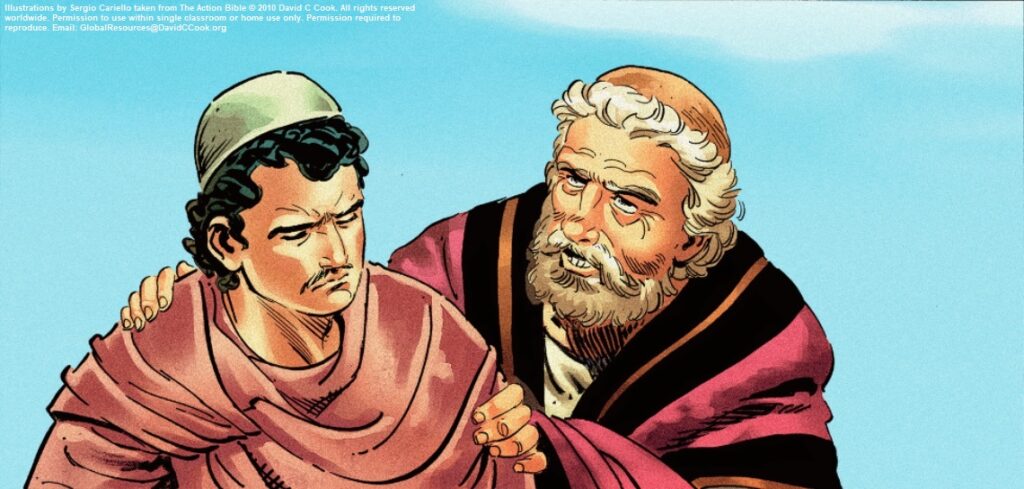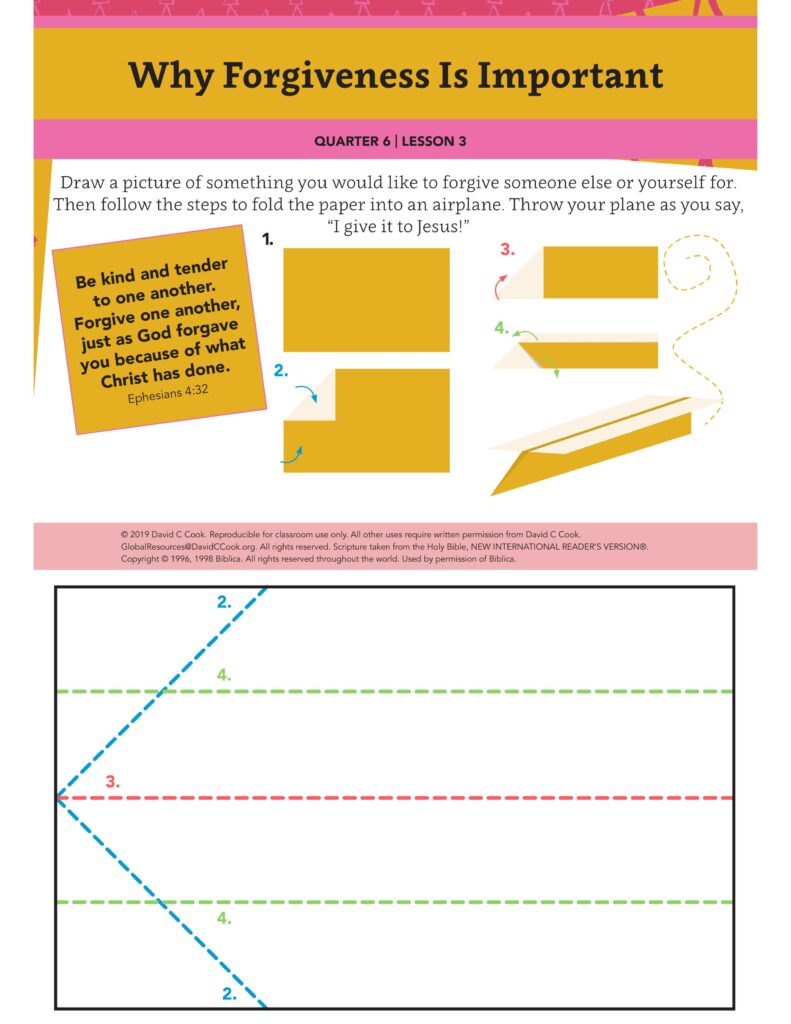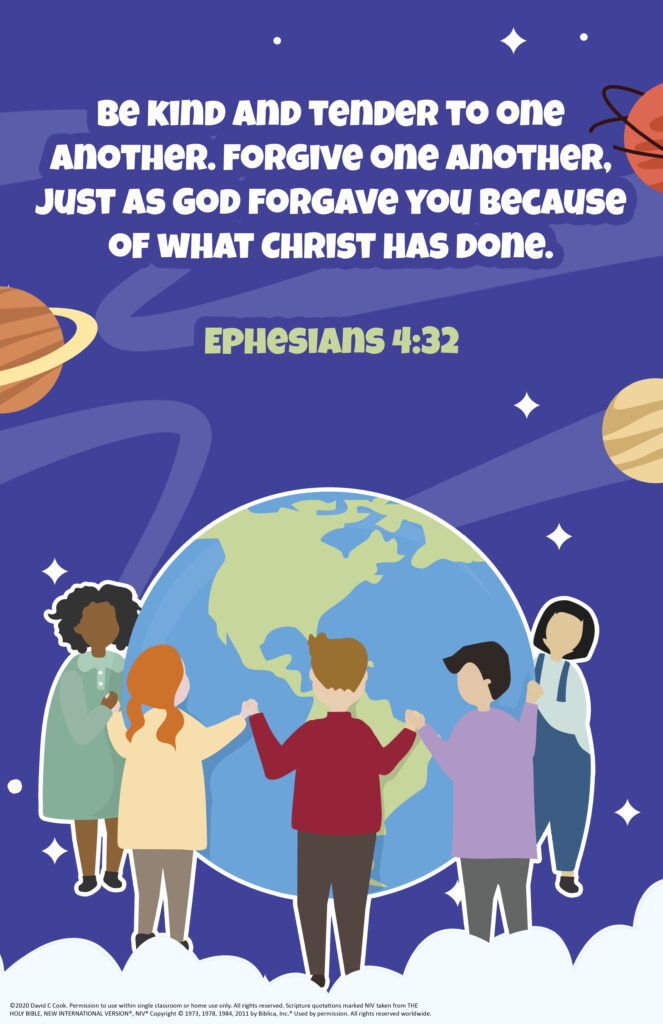During the lesson, the information for you to know is written in regular type, and what we suggest speaking or reading aloud to children is in bold. All resources for this lesson, including the Teacher Guide, Student Page, Family Connection Card, and other resources can be downloaded in a ZIP file by clicking on the following link:
In some lessons you will find "resource articles." These are articles written by experts from around the world to help equip you for your work with children and adolescents. Share them with parents or guardians if you consider it appropriate.
He has saved us from the kingdom of darkness.
He has brought us into the kingdom of the Son he loves.
Because of what the Son has done, we have been set free.
Because of him, all our sins have been forgiven.
Colossians 1:13–14
Forgiveness frees us from death. When Jesus died, He allowed those who believe in Him to be set free from sin. Sin is like a tremendous weight. It causes us to feel deeply upset and makes it difficult for us to do what we truly desire—to honour and serve the One who made us. Jesus died for us so that we could be forgiven!
When you forgive someone, there is a releasing of the debt owed because of the wrong that was done. Forgiving someone does not mean that what the person did was okay. It means you can trust God with the wrong and be set free of anger and hurt. That does not mean you will never think about what happened, but when you do, you will not feel consumed by anger or bitterness. Praise God for encouraging you to forgive others and yourself! Praise Him for forgiving you! Know that He loves you so much that He sent His Son to die for you!
Encourage families to talk to their children about a time they forgave someone. Ask them to tell their children what it felt like to release the feelings of anger and hurt.
Teacher Tip: If possible, email or text the Family Connection Card to the families of your students.
Welcome the students as they enter and ask them to form 1 line of girls and 1 line of boys. The lines should be next to each other. The children may sit for the first part of the lesson if needed.
You have been learning what forgiveness is and how to forgive.
Do you remember what it means to forgive someone?
Allow 2–3 children to respond.
Forgiveness means choosing to let go of a wrong that was done. When someone does something wrong to you, forgiving that person means giving your pain to God. Forgiveness means that you trust God to look at what happened and decide the right way to deal with it. Today let’s learn a song to help you remember why forgiveness is important. Listen to the words and join in when you can.
Sing the words to a melody you know or a rhythm you create. Repeat these words to this song until the children are familiar with the words and melody.
I was hurt by a wrong, wrong, wrong. God wants me to forgive. I forgive you. It is important!
Have the line of girls and line of boys stand up. Ask the first 2 children in each line to face each other and make an arch by holding both arms up and joining hands.
Now we will play a game called “The Trap of Hurt and Anger.” These arches represent the trap. The children in line will walk under the arch as everyone sings the song. After you walk under the arch, you will return to the end of your line. When you sing the last word of the song, the arch will lower around the person walking under the arch at that time. This trap of hurt and anger captures the person under the arch. When the trapped person forgives, that person will be freed from the trap.
The trapped person will say, “I forgive you!” The children forming the arch will say, “Your hurt and anger are lifted” and raise their arms. The person will be freed, and everyone will start singing and walking under the arch again.
Sing the song again until you get to the last word and another person gets trapped. That person gets set free by saying, “I forgive you!” Continue playing for about 5 minutes. Then ask all of the children to sit in their regular seats.
Optional: After 2 children are trapped, you can switch the 2 people making the arch.
If you choose not to forgive, you stay in the trap. Keeping anger and other hurtful emotions in your heart keeps you in the trap. When you forgive others and yourself, you are set free from hurt and anger just like you were set free in this game.
Have the children sit in a circle for the rest of the lesson.
Optional: If possible, share the image from The Action Bible. If you are using The Action Bible, review the first part of the story of “A Loving Father” with the children. The story is found on pages 600–602; Do not read page 603 yet.

Remember the story from the Bible about the lost son? The lost son returned home not knowing if his father would forgive him. Listen to what the father said when the son came home.
Read this verse directly from your Bible.
“This son of mine was dead. And now he is alive again. He was lost. And now he is found.” So, they began to celebrate.
Luke 15:24
Why did the father forgive his lost son?
Allow 2–3 children to respond.
He thought his son was gone, but his son returned hoping to be taken back into the family as a servant. After the father forgave his son, he had a feast for him! There was food, music, and dancing! Forgiving is like a celebration! When you forgive someone, you feel better. It fills you with peace and joy! Let’s celebrate as though we have just forgiven someone!
Lead the children in dancing and singing for 1 minute. Then ask the children to sit down.
Not everyone in the lost son’s family felt the same way as the father. The older son felt angry. He could not believe that his father was having a party for his brother when his father had never had a party like that for him. Listen to what the older son said to his father.
But he answered his father, “Look! All these years I’ve worked like a slave for you. I have always obeyed your orders. You never gave me even a young goat so I could celebrate with my friends.”
Luke 15:29
If you were the older son, how might you have felt?
Answers may include: angry, jealous, sad, or similar emotions.
Make an angry face like the older son may have made. The older son did not feel his father had been fair to him. He was angry at both his brother and his father, so he chose not to celebrate with everyone!
Why do you think the older son was hurt and angry at his brother?
Allow 2–3 children to respond.
Optional: If you are using The Action Bible, read page 603 to the children.
When we do not forgive others, we miss out on things too. For example, if we choose to stay angry at a sister who has done something wrong to us, we miss out on a loving relationship with her. Even if the person we forgive will never repay our act of love with kindness, it is important to forgive that person. In the story of the lost son, the Bible does not tell us whether the older son ever forgave his brother.
What could the older son have done to make peace with his brother?
Allow 3–4 children to respond.
The older brother was angry and hurt! It might be easy for you to understand why he would be so angry. However, he allowed his anger and hurt to take over instead of stopping them with forgiveness. Let’s do an activity to help us learn what happens when we do not forgive someone.
Place the empty bucket at the front of the teaching space next to the pile of rocks.
This bucket will help us to find out what happens when we hold on to the hurt and anger caused by others instead of forgiving them. Each of you will come up and place a rock in the bucket.
Think of something someone has done to hurt you or make you angry. Or think of something you have done that you are angry at yourself for doing. When you think of something, pick up a rock from the pile and place it in the bucket.
Allow no more than 5 minutes for the children to come and place rocks in the bucket. Then choose a volunteer to pick up the bucket. Ask the volunteer to tell the class whether the bucket is heavy or light.
When you choose not to forgive someone for something, your heart and body can feel like this bucket. The feelings of hurt and anger are heavy.
Sometimes you might not want to forgive someone else. There may also be times when you struggle to accept God’s forgiveness of you for something you did that you knew was wrong. Even if people on earth do not want to forgive you, your Father in heaven will forgive you. God wants us to forgive because we are forgiven. Listen to what the Bible says about how we should treat others.
Be kind and tender to one another. Forgive one another, just as God forgave you because of what Christ has done.
Ephesians 4:32
We are asked to be kind and tender to others. Christ died for all of our sins. He did not say, “I will forgive this sin but not that one.” It is also important for us to forgive no matter what wrong has been done and how much it hurt. We can forgive others because Jesus Christ created a way for God to forgive us.
So why is it important to forgive yourself and to forgive others?
To have peace and joy. To stay calm. To be set free from anger and hurt.
Yes, forgiving others and accepting God’s forgiveness sets you free and gives you joy and peace. Forgiveness takes the heavy weight of anger and hurt off of you. It allows your heart to be filled with peace and joy instead of anger and hurt. It frees space in your heart. It sets you free!
Optional: If you are using Student Pages, give the children crayons and allow 2 minutes for them to draw pictures of what they want to forgive. Then guide them in folding their pictures into paper airplanes.

Gather the children around the bucket of rocks.
This bucket of rocks shows us what it is like to be angry, sad, and hurt by a wrong done to us by someone else. You may also feel this way when you are filled with shame for a wrong you have done. Raise your hand if you would like to pick it up and carry it over to me.
Allow a few children to try to carry the bucket. It should be difficult to carry because it is heavy. Some children may not be able to lift it at all.
It is not easy to carry a heavy bucket filled with rocks. The bucket is a burden to carry. A burden is a heavy load or a difficult task that must be done. When you keep anger in your heart and do not forgive others or you hang on to the bad feelings you have about hurting someone else, your heart is heavy just like this bucket. It is important to forgive others and accept God’s forgiveness so you do not carry this heavy burden in your heart wherever you go.
How can we make this burden lighter?
Allow 2–3 children to respond.
We can make the bucket lighter by taking out the rocks. When we forgive others and accept God’s forgiveness of ourselves, we lighten our burdens. It frees us from the weight of anger and hurt. It is important to forgive others and know that we can be forgiven.
Think for a moment about something that has been done to hurt you. Close your eyes. Think of a wrong that has been done to you or by you that feels like a heavy burden you are carrying. Open your eyes. Keep that wrong in your mind.
In a moment, you will come to the front of our space and take a rock from the bucket. Then you will place the rock in a pile next to the bucket. As you place the rock down, say “I forgive you! I give this to God!” As you put the rock down, give your hurt and anger to God and let Him take care of it. Let’s lighten our burdens and forgive someone!
Allow the children to come to the front of the space and remove rocks from the bucket. If needed, have the children form a line near the bucket and ask 2–3 children to go to the bucket before allowing more children to go to it. Ask the children to form a circle once they have participated in the activity. Once all of the children have participated in the activity, pick up the empty bucket.
Raise your hand if you think it will be easy to carry the bucket now. Let’s find out if you are right. I will pass around the bucket so everyone can feel its weight.
Give the children enough time to pass the bucket around the circle. Ask them whether it is heavy or light.
With the rocks out of the bucket, it is not a burden to carry the bucket. When you let go of anger and hurt through forgiveness, you lighten your burden. Forgiving sets you free! God wants us to forgive others because He sent His Son so that we could be forgiven. Our memory verse today reminds us of the importance of forgiveness.
If you are using the Memory Verse Poster, show it to the students.
Be kind and tender to one another. Forgive one another, just as God forgave you because of what Christ has done.
Ephesians 4:32

Do the following motions as you read through the memory verse. Repeat the actions and words with the children 3 times.
End class by saying this blessing, based on Ephesians 4:32, over the children.
Blessing: May you be kind and tender toward others. May you learn to forgive others because Jesus made a way for God to forgive you!
Lead the children in singing this quarter’s song, if possible.
Life on Life ©2020 David C Cook. Reproducible for home or classroom use only. All other uses require written permission from David C Cook [email protected]. All rights reserved.